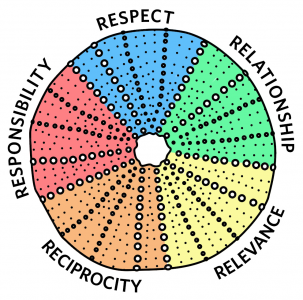Why think about Indigenous approaches to pedagogy when designing your online courses?
This video was originally recorded to introduce UBC’s MOOC
|

|
In this video, Dr. Jan Hare, UBC Professor of Indigenous Education for Teacher Education, offers some useful answers. Reconciliation and decolonization demand change and transformation, she argues, including transformation of education – “the dismantling of institutional structures, policies and practices that perpetuate forms of colonialism”. Dr Hare emphasizes the work of settler scholar Dr. Paulette Regan, who defines reconciliation as “practices of peaceful resistance, accepting personal and political responsibility for shifting colonial attitudes and actions that do not serve non-Indigenous folks well in their relationship with Indigenous peoples.
Principles of Indigenous pedagogy benefit all learners
Including Indigenous education in the curriculum is not just more inclusive, it’s just good pedagogy.
(Restoule & Chaw-in-is, 2017, p.9)
In 2017, in their paper for the Canadian Commission for UNESCO titled Old ways are the new way forward: How Indigenous pedagogy can benefit everyone, Dr. Jean-Paul Restoule and Chaw-win-is (Indigenous Resurgence Coordinator at the University of Victoria, Canada) explored the relationship between Indigenous ways of teaching and new teaching strategies.
In their report, they explore the many ways that Indigenous approaches to teaching and learning are meaningful and relevant for every learner, and can support success for all learners. Integrating Indigenous epistemologies and pedagogies into course design, they explain:
- Supports learners’ holistic development, fulfilling emotional, physical, spiritual, individualistic, and cognitive needs.
- Recognizes the importance of relationships with self, land, and community, for learning.
- Promotes learner understanding of the importance of respect, responsibility, and relevance to the self, land, community, and culture.
The 5Rs model for integrating Indigenous pedagogies online
Restoule and colleagues (Restoule, 2017; Tessaro et. al., 2018; Tessaro & Restoule, 2022) have drawn on case studies of online learning development projects to develop the ‘Five Rs’ model to guide the integration of principles of Indigenous pedagogy in online learning.
This web-based resource guides you through the elements of the 5Rs model, and offers you ideas, themes, resources and example activities that you can include in the design of your online courses. Short videos offer you insights and suggestions from Indigenous and non-Indigenous colleagues engaged in this work.

